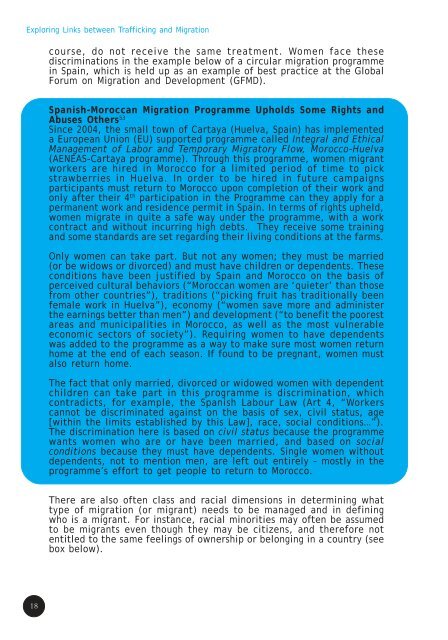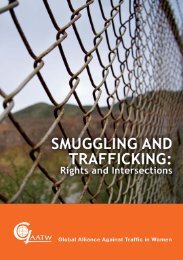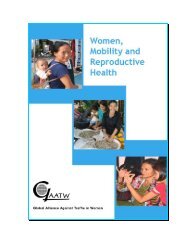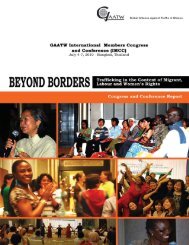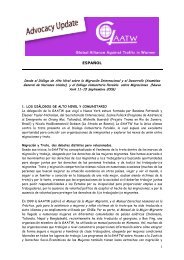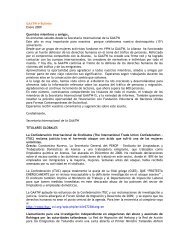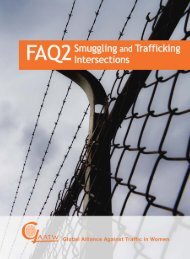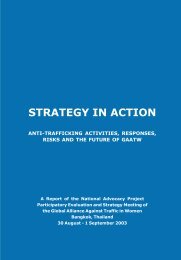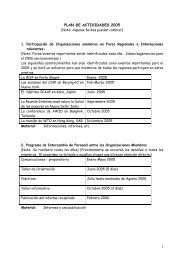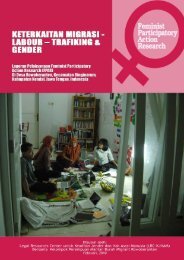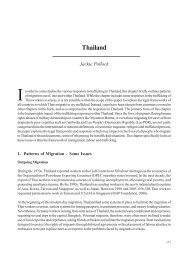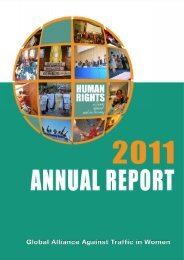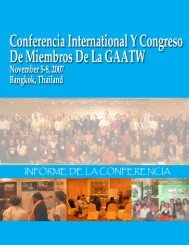Exploring Links between Trafficking and Migration - Global Alliance ...
Exploring Links between Trafficking and Migration - Global Alliance ...
Exploring Links between Trafficking and Migration - Global Alliance ...
- No tags were found...
You also want an ePaper? Increase the reach of your titles
YUMPU automatically turns print PDFs into web optimized ePapers that Google loves.
<strong>Exploring</strong> <strong>Links</strong> <strong>between</strong> <strong>Trafficking</strong> <strong>and</strong> <strong>Migration</strong>course, do not receive the same treatment. Women face thesediscriminations in the example below of a circular migration programmein Spain, which is held up as an example of best practice at the <strong>Global</strong>Forum on <strong>Migration</strong> <strong>and</strong> Development (GFMD).Spanish-Moroccan <strong>Migration</strong> Programme Upholds Some Rights <strong>and</strong>Abuses Others 53Since 2004, the small town of Cartaya (Huelva, Spain) has implementeda European Union (EU) supported programme called Integral <strong>and</strong> EthicalManagement of Labor <strong>and</strong> Temporary Migratory Flow, Morocco-Huelva(AENEAS-Cartaya programme). Through this programme, women migrantworkers are hired in Morocco for a limited period of time to pickstrawberries in Huelva. In order to be hired in future campaignsparticipants must return to Morocco upon completion of their work <strong>and</strong>only after their 4 th participation in the Programme can they apply for apermanent work <strong>and</strong> residence permit in Spain. In terms of rights upheld,women migrate in quite a safe way under the programme, with a workcontract <strong>and</strong> without incurring high debts. They receive some training<strong>and</strong> some st<strong>and</strong>ards are set regarding their living conditions at the farms.Only women can take part. But not any women; they must be married(or be widows or divorced) <strong>and</strong> must have children or dependents. Theseconditions have been justified by Spain <strong>and</strong> Morocco on the basis ofperceived cultural behaviors (“Moroccan women are ‘quieter’ than thosefrom other countries”), traditions (“picking fruit has traditionally beenfemale work in Huelva”), economy (“women save more <strong>and</strong> administerthe earnings better than men”) <strong>and</strong> development (“to benefit the poorestareas <strong>and</strong> municipalities in Morocco, as well as the most vulnerableeconomic sectors of society”). Requiring women to have dependentswas added to the programme as a way to make sure most women returnhome at the end of each season. If found to be pregnant, women mustalso return home.The fact that only married, divorced or widowed women with dependentchildren can take part in this programme is discrimination, whichcontradicts, for example, the Spanish Labour Law (Art 4, “Workerscannot be discriminated against on the basis of sex, civil status, age[within the limits established by this Law], race, social conditions…”).The discrimination here is based on civil status because the programmewants women who are or have been married, <strong>and</strong> based on socialconditions because they must have dependents. Single women withoutdependents, not to mention men, are left out entirely – mostly in theprogramme’s effort to get people to return to Morocco.There are also often class <strong>and</strong> racial dimensions in determining whattype of migration (or migrant) needs to be managed <strong>and</strong> in definingwho is a migrant. For instance, racial minorities may often be assumedto be migrants even though they may be citizens, <strong>and</strong> therefore notentitled to the same feelings of ownership or belonging in a country (seebox below).18


